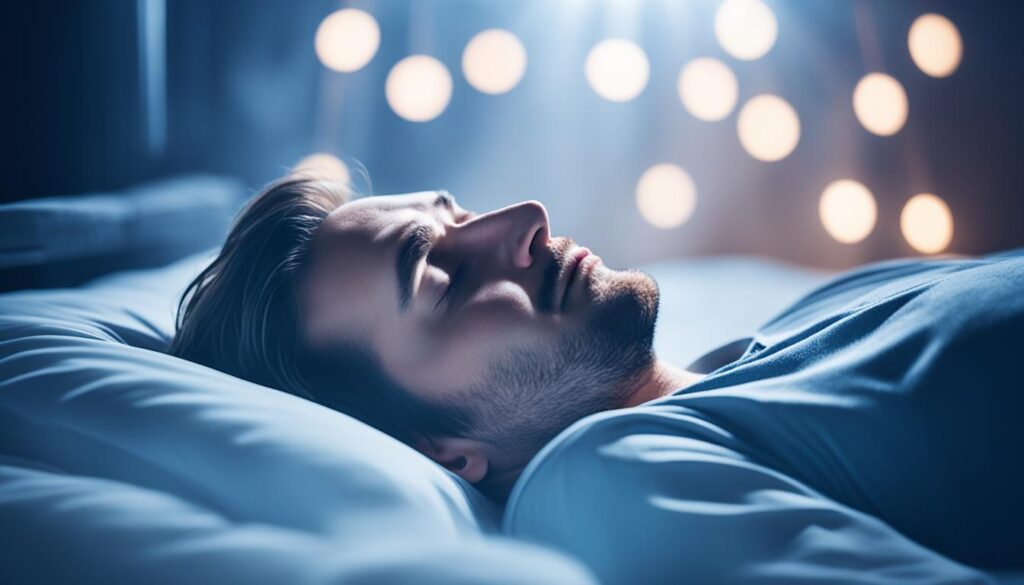Have you ever been in a dream and knew you were dreaming? That’s the magic of lucid dreaming. It lets you control your dreams. But, you might ask, how does it change your sleep?
Lucid dreaming happens during REM sleep, which is key for memory and emotions1. It’s a chance to explore your mind. About 55% of people have had a lucid dream, showing it’s quite common12.
Lucid dreams can be good or bad for sleep. They might stop you from sleeping well1. Yet, some people feel more awake after these dreams than others3. This shows we need more study on lucid dreaming and sleep.
Key Takeaways
- Lucid dreaming occurs during REM sleep
- Over half of people experience at least one lucid dream
- It can both enhance and disrupt sleep quality
- Effects on sleep vary among individuals
- More research is needed to fully understand its impact
Understanding Lucid Dreams: A Gateway to Conscious Dreaming
Lucid dreaming opens a world of dream control and exploring your mind. It’s when you know you’re dreaming and can change the dream. Let’s explore this amazing experience.
Definition and Characteristics of Lucid Dreaming
Lucid dreams are vivid dreams where you know you’re dreaming and can change the dream. More than half of adults have had a lucid dream at some point4. In these dreams, you might feel like you’re in a real place, but your body might not feel real4.
Prevalence and Frequency of Lucid Dreams
About 20% of people have lucid dreams every month, and a few have them several times a week5. Half of all people have had at least one lucid dream5. Each night, we dream for about two hours as we sleep6.
The Science Behind Lucid Dreaming
Scientists have studied lucid dreaming and found some interesting things. People who dream a lot show better communication in their brains during sleep5. They can even talk to awake people using eye signals, showing that time moves the same in dreams as in real life4.

Lucid dreaming has been around for a long time, in ancient traditions and now in science. Researchers use eye movements in REM sleep to study it4. This mix of old wisdom and new science makes lucid dreaming very interesting for understanding dreams and the mind.
| Aspect | Description |
|---|---|
| Definition | Awareness of dreaming while asleep |
| Prevalence | 20% experience monthly, 50% at least once in lifetime |
| Scientific Indicators | Specific eye movements during REM sleep |
| Brain Activity | Increased communication between certain regions |
| Historical Context | Rooted in Buddhist and philosophical traditions |
The Relationship Between Lucid Dreaming and Sleep Cycles
Lucid dreaming and sleep cycles are closely linked. Your sleep has different stages, with REM sleep being key for dreams. This link helps us understand conscious dreaming better.
REM Sleep and Lucid Dreaming
REM sleep is when vivid dreams happen. This is also when lucid dreaming usually occurs. About 55% of people have had a lucid dream, with 23% dreaming often7. Lucid dreams and sleep paralysis both happen during REM sleep, a mix of being asleep and awake7.

Brain Activity During Lucid Dreams
Your brain acts differently during lucid dreams, showing traits of sleep and wakefulness. This mix creates a special kind of consciousness. Only about 37% of lucid dreamers can control their dreams, showing how complex it is7.
Impact on Sleep Architecture
Research is looking into how lucid dreaming affects sleep patterns. Some studies say it might change sleep cycles. A study found lucid dreaming made people feel more awake after sleeping8.
But, other studies found that trying too hard to dream lucidly can lead to poor sleep8. Lucid dreaming therapy is being looked at as a way to help with nightmares. About 64% of those interested in lucid dreaming use it to make nightmares better9.
This shows lucid dreaming can change sleep patterns, but its effects vary. They depend on the person and their goals.
Lucid Dreaming and Its Impact on Sleep Quality
Lucid dreaming can affect your sleep in good and bad ways. More than half of people feel less tired the day after lucid dreams. But, about 12.5% feel more tired10. This shows that lucid dreaming usually doesn’t harm sleep quality much for most people.
Lucid dreaming can make you feel fresh and inspired. But, having many lucid dreams in a row can make you tired11. It’s important to get enough sleep, as adults need at least seven hours a night11.

Using techniques for lucid dreaming can change how it affects your sleep. Some methods might cause sleep problems if used too much, leading to disrupted sleep10. This can make your sleep broken, raising the chance of health problems12.
Studies show lucid dreaming can be good for your mind. A University of Lincoln study found that those who lucid dream a lot do better in tasks that need insight and solving problems12. People who have lucid dreams often think deeply. Studies say they have a bigger part of the brain that helps with thinking11.
| Aspect | Positive Impact | Negative Impact |
|---|---|---|
| Next-day Fatigue | 50% feel less tired | 12.5% feel more tired |
| Cognitive Function | Improved problem-solving skills | Potential reality confusion |
| Emotional Regulation | Enhanced emotional control | Possible psychological distress |
| Sleep Pattern | Can feel refreshed after successful lucid dream | Risk of sleep disruption |
Lucid dreaming has its upsides like boosting creativity and controlling emotions. But, it can also lead to sleep deprivation, mental health issues, and physical harm in rare cases12. It’s important to balance lucid dreaming with good sleep habits to enjoy its benefits without hurting your health.
Potential Benefits of Lucid Dreaming
Lucid dreaming can help you grow and heal in ways beyond sleep. It’s when you know you’re dreaming. This can be a powerful tool for personal growth and healing.
Nightmare Reduction and PTSD Management
Lucid dreaming is great for stopping nightmares and helping with PTSD. About half of people have had a lucid dream, and 11% have them every month13. For those with scary dreams, lucid dreaming can help control them. This can help overcome fears and phobias13.
This method is especially good for people with PTSD. It offers a new way to treat this condition.

Enhancing Creativity and Problem-Solving Skills
Lucid dreaming can boost your creativity and improve how you solve problems. It’s like having your own virtual reality adventure13. People who love new experiences and are creative tend to have more lucid dreams. This shows a link between lucid dreaming and being innovative14.
Exploring Consciousness and Self-Awareness
Lucid dreaming lets you explore your consciousness. By testing reality and keeping a dream journal, you can become more aware in dreams and real life13. Research shows that lucid dreaming can make you feel happier in the day. This means it could be good for your overall well-being15.
But, we need more studies to really understand lucid dreaming’s benefits. Always keep your sleep healthy and talk to a doctor if you have worries151314.
Risks and Concerns Associated with Lucid Dreaming
Lucid dreaming can be exciting but comes with risks. Sleep disruption is a big worry, especially with techniques that break up your sleep. You might wake up more often or have trouble sleeping again, hurting your sleep quality16.
Thinking about your mental health is also key. Some people have lucid nightmares that scare them, even though they know they’re dreaming17. This can make you feel more anxious and stressed when you wake up.
Studies show mixed results on how lucid dreaming affects your mental health. Some say it can make you feel better and less lonely. But others warn of risks1817. A long-term study found that trying to make lucid dreams might make it hard to tell what’s real and what’s a dream. This could make symptoms of feeling disconnected and odd thoughts worse17.
About 10% of lucid dreams are bad and make you feel down1817. Having more lucid dreams doesn’t mean you’ll sleep better or feel more disconnected. But it can make you feel like things aren’t real1817.
If you want to try lucid dreaming, do it carefully. Watch how it changes your sleep and how you feel. If it starts to hurt your sleep or mood, talk to a sleep expert or mental health pro.
Techniques for Inducing Lucid Dreams
Lucid dream induction has become more popular lately. About 55% of adults have had a lucid dream, with 23% dreaming lucidly every month19. Many people got into it more during the pandemic20.
Mnemonic Induction of Lucid Dreams (MILD)
MILD is the top way to start lucid dreams20. You wake up, then say: “Next time I’m asleep, I’ll remember I’m dreaming.” Try to go back to sleep 30 to 120 minutes later19.
Wake Back to Bed (WBTB) Method
With WBTB, you wake up in the middle of sleep and go back to bed later. It works well but might mess up your sleep pattern. Some people feel more awake after lucid dreams. But, WBTB might make you sleep less if you don’t sleep in long enough20.
Reality Checking and Dream Journaling
Checking reality during the day helps you remember dreams better. Writing down your dreams improves your ability to recognize them. Doing activities in lucid dreams can also help you in real life20.
| Technique | Description | Effectiveness |
|---|---|---|
| MILD | Repeating a phrase before sleep | Most effective |
| WBTB | Waking mid-sleep, then returning to bed | Effective but may disrupt sleep |
| Reality Checks | Regularly questioning reality | Improves dream awareness |
| Dream Journaling | Recording dreams upon waking | Enhances dream recall |
These techniques can be fun but be careful. Too much might mess with your sleep and mind. It’s best to dream lucidly in a balanced way to keep your sleep healthy20.
Measuring Sleep Quality in Relation to Lucid Dreaming
Lucid dreaming affects sleep quality in many ways. Researchers use different methods to study this link. They look at everything from what people say to advanced technology.
Subjective Measures: Sleep Diaries and Questionnaires
Sleep diaries and questionnaires are key for checking sleep quality. They let you track your sleep, dreams, and how rested you feel. The Pittsburgh Sleep Quality Index (PSQI) is a common test that looks at sleep quality over a month. It looks at seven areas21.
Studies show that these self-reported sleep measures are reliable22. They also find that lucid dreaming might make you feel more awake in the morning21.
Objective Measures: Polysomnography and Actigraphy
For detailed data, scientists use polysomnography and actigraphy. Polysomnography records brain waves and other sleep activities. Actigraphy tracks sleep patterns with a wearable device.
The ZMax headband is an advanced tool that records brain activity and more during sleep23. It can automatically spot REM sleep after a two-hour wait23. These methods give a clear view of the changes in sleep during lucid dreams.
Assessing Daytime Sleepiness and Cognitive Function
Looking at how you feel during the day is also important. Researchers check how sleepy you are and how well you think during the day. They want to see how lucid dreaming affects your daily life.
Some studies link positive dreams to better sleep and feeling calm during the day23. Dream mindfulness can also improve thinking after sleep23. By looking at sleep quality and daytime functions, researchers aim to understand the link between lucid dreaming and sleep health.
FAQ
What is lucid dreaming?
Lucid dreaming is when you’re dreaming and you know you’re dreaming. You can control what happens in the dream. It’s a vivid dream where you’re aware and in charge.
How common are lucid dreams?
About 55% of people have had a lucid dream at some point. Those who spend more time in REM sleep and people with narcolepsy dream lucidly more often.
When do lucid dreams occur?
Lucid dreams happen mostly during REM sleep. This is the stage where dreams are the most vivid.
What is the relationship between lucid dreaming and sleep quality?
Researchers are still looking into how lucid dreaming affects sleep. Some think it might mess up sleep patterns and cause sleep deprivation. But, other studies say it might help a little or have no big effect.
What are some potential benefits of lucid dreaming?
Lucid dreaming could help reduce nightmares for people with PTSD. It might also boost creativity and problem-solving skills. Plus, it could help us understand ourselves better. But, we need more studies to be sure.
Are there any risks associated with lucid dreaming?
Yes, there are risks. Lucid dreaming could mess up your sleep patterns, especially if you use methods that wake you up during sleep. It might also be bad for mental health, especially for those who could get psychosis or feel disconnected from reality.
How can lucid dreams be induced?
You can try MILD (Mnemonic Induction of Lucid Dreams), WBTB (Wake Back to Bed), reality checking, or dream journaling. But, these methods might mess with your sleep.
How is sleep quality measured in relation to lucid dreaming?
Sleep quality is checked with sleep diaries, questionnaires, and by recording brain waves and muscle activity. Tracking sleep cycles and how awake you feel during the day can also give clues.
Source Links
- https://www.soundsleepmedical.com/blog/does-lucid-dreaming-affect-your-sleep-quality/
- https://www.britannica.com/science/lucid-dreaming
- https://www.ncbi.nlm.nih.gov/pmc/articles/PMC7445824/
- https://www.noemamag.com/living-in-a-lucid-dream
- https://www.healthline.com/health/lucid-dreaming-the-latest-on-its-mental-health-benefits-and-risks
- https://www.sleepfoundation.org/dreams/dangers-of-lucid-dreaming
- https://www.ncbi.nlm.nih.gov/pmc/articles/PMC10218966/
- https://www.frontiersin.org/journals/psychology/articles/10.3389/fpsyg.2020.01290/full
- https://www.nature.com/articles/s41598-022-19624-4
- https://www.mynextmattress.co.uk/blog/does-lucid-dreaming-affect-sleep-quality/
- https://www.oniri.io/post/can-lucid-dreaming-harm-you
- https://www.sleepcycle.com/how-to-fall-asleep/sleep-dream-and-boost-your-creativity/
- https://www.medicalnewstoday.com/articles/323077
- https://www.webmd.com/sleep-disorders/lucid-dreams-overview
- https://www.ncbi.nlm.nih.gov/pmc/articles/PMC10104404/
- https://www.sleepfoundation.org/dreams/how-do-dreams-affect-sleep
- https://thedebrief.org/the-hidden-world-of-lucid-dreaming-surprising-benefits-and-unforeseen-risks-revealed-in-new-research/
- https://www.psypost.org/can-lucid-dreaming-be-dangerous-new-research-suggests-lucid-dreaming-is-generally-a-safe-and-positive-experience/
- https://www.sleepfoundation.org/dreams/lucid-dreams
- https://www.bbc.com/future/article/20230425-can-lucid-dreaming-be-harmful
- https://www.ncbi.nlm.nih.gov/pmc/articles/PMC7330170/
- https://journals.ub.uni-heidelberg.de/index.php/IJoDR/article/download/48341/pdf/167080
- https://www.sciencedirect.com/science/article/abs/pii/S1053810020300301



